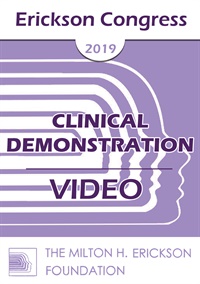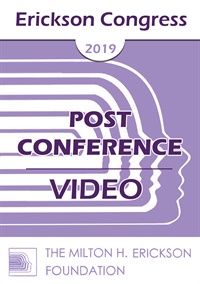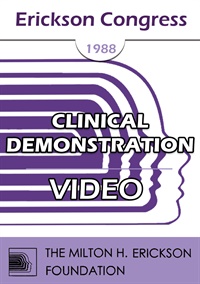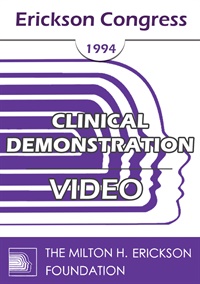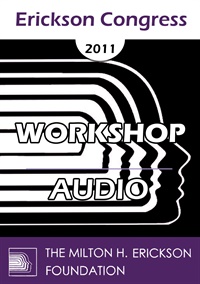
- Average Rating:
- Not yet rated
- Topic Areas:
- Workshops | Children and Adolescent Therapy | Ericksonian Hypnosis and Therapy Techniques | Brief Therapy | Hypnotherapy | Psychosomatics
- Categories:
- Erickson Congress | Erickson Congress 2011
- Faculty:
- Charlotte Wirl
- Duration:
- 59 Minutes
- Format:
- Audio Only
- Original Program Date:
- Dec 07, 2011
- Short Description:
- Brief hypnotherapy is particularly suited for children and adolescents with psychosomatic disorders, be-cause it exploits their natural abilities to fall into trance and uses a language of symbols and metaphors. It is based on the Ericksonian belief in the abilities of a child and is astonishing in its effectiveness.
- Price:
- $20.00 - Base Price
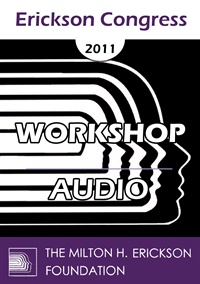
- Average Rating:
- Not yet rated
- Topic Areas:
- Workshops | Brief Therapy | Consciousness | Ericksonian Hypnosis and Therapy Techniques | Unconscious Processes | Hypnosis
- Categories:
- Erickson Congress | Erickson Congress 2011
- Faculty:
- Joseph Dowling, MS, LPC
- Duration:
- 59 Minutes
- Format:
- Audio Only
- Original Program Date:
- Dec 07, 2011
- Short Description:
- Milton H. Erickson, MD, understood that anxiety was often created and exacerbated by the conscious (thinking) mind, while the unconscious mind is an infinite storehouse of talents, solutions, and healing energies. This workshop will teach a brief, solution-focused, strategic, and hypnotic approach to anxiety related disorders.
- Price:
- $20.00 - Base Price
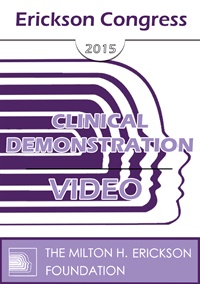
- Average Rating:
- Not yet rated
- Topic Areas:
- Clinical Demonstrations | Therapist Development | Treatment Planning | Brief Therapy | Motivation
- Categories:
- Erickson Congress | Erickson Congress 2015
- Faculty:
- Michael Munion, MA, LPC
- Course Levels:
- Master Degree or Higher in Health-Related Field
- Duration:
- 00:54:00
- Format:
- Audio and Video
- Original Program Date:
- Dec 10, 2015
- Short Description:
- Change potential is enhanced by creating success experience during the therapeutic encounter, and by developing individualized tools to reinforce change on an ongoing basis. This demonstration assesses personal resources, motivation, and develops an individualized change plan.
- Price:
-
Sale is $29.00
price reduced from Base Price - $59.00

- Average Rating:
- Not yet rated
- Topic Areas:
- Clinical Demonstrations | Communication | Therapist Development | Brief Therapy
- Categories:
- Erickson Congress | Erickson Congress 2015
- Faculty:
- Rubin Battino, MS
- Course Levels:
- Master Degree or Higher in Health-Related Field
- Duration:
- 01:00:00
- Format:
- Audio and Video
- Original Program Date:
- Dec 12, 2015
- Short Description:
- Chatting has evolved over the years as the presenter's main mode of effective therapeutic change. This will be demonstrated with a volunteer. The essence of chatting is being so comfortable that each can share and talk openly. Sessions generally end with a summarizing hypnosis experience.
- Price:
-
Sale is $29.00
price reduced from Base Price - $59.00
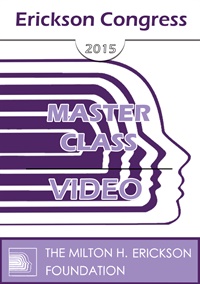
- Average Rating:
- Not yet rated
- Topic Areas:
- Ericksonian Psychotherapy | Psychotherapy | Master Classes | Brief Therapy | Ericksonian Hypnosis and Therapy Techniques | Self-Relations | Experiential Therapy | Hypnosis
- Categories:
- Erickson Congress | Erickson Congress 2015 | Master Class
- Faculty:
- Jeffrey Zeig, PhD | Stephen Gilligan, PhD
- Course Levels:
- Master Degree or Higher in Health-Related Field
- Duration:
- 5 Hours 9 Minutes
- Format:
- Audio and Video
- Original Program Date:
- Dec 13, 2015
- Short Description:
- Ericksonian hypnotherapy and the Self-Relations approach are experiential methods of change. In combination they can be synergistic. Psychotherapy is best when clients have a first-hand experience of an alive therapeutic process. Such dynamic empowering experiences pave the way for dynamic understandings. Drs. Gilligan and Zeig will engage with each other and the participants to examine commonalities and differences in their work.
- Price:
- $99.99 - Base Price
IC19 Clinical Demonstration 03 - Guided Imagery and Brief Therapy Using Hypnosis - Rubin Battino, MS
- Average Rating:
- Not yet rated
- Topic Areas:
- Clinical Demonstrations | Brief Therapy | Hypnosis | Meditation, Spirituality and Yoga
- Categories:
- Erickson Congress | Erickson Congress 2019
- Faculty:
- Rubin Battino, MS
- Course Levels:
- Master Degree or Higher in Health-Related Field
- Duration:
- 57 Minutes
- Format:
- Audio and Video
- Original Program Date:
- Dec 15, 2019
- Short Description:
- The use of guided imagery using hypnosis will be demonstrated with a volunteer as a method of doing brief therapy. The volunteer may present a physical or behavioral difficulty for this demonstration. Also demonstrated will be the use of physical anchors.
- Price:
-
Sale is $29.00
price reduced from Base Price - $59.00
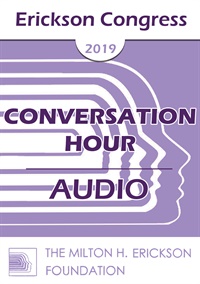
- Average Rating:
- Not yet rated
- Topic Areas:
- Conversation Hours | Psychotherapy | Brief Therapy | Strategic Therapy | Utilization
- Categories:
- Erickson Congress | Erickson Congress 2019
- Faculty:
- Eric Greenleaf, PhD
- Duration:
- 59 Minutes
- Format:
- Audio Only
- Original Program Date:
- Dec 13, 2019
- Short Description:
- Participants will discuss the place of emotional expression in the conduct of modern brief, strategic and hypnotic psychotherapies.
- Price:
- $15.00 - Base Price
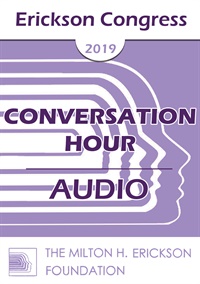
- Average Rating:
- Not yet rated
- Topic Areas:
- Conversation Hours | Genomics | Brief Therapy | Psychotherapy | Neuroscience
- Categories:
- Erickson Congress | Erickson Congress 2019
- Faculty:
- Kathryn Rossi, PhD
- Duration:
- 58 Minutes
- Format:
- Audio Only
- Original Program Date:
- Dec 14, 2019
- Short Description:
- Great strides have been made in PsychoSocial Genomics as well as the placebo effects in psychotherapy. We will share our views of how these new state-of-the-arts sciences can gently be integrated into psychotherapy sessions and improve outcomes.
- Price:
- $15.00 - Base Price
- Average Rating:
- Not yet rated
- Topic Areas:
- Master Classes | Ericksonian Psychotherapy | Psychotherapy | Brief Therapy | Hypnotherapy | Self-Relations | Utilization
- Categories:
- Erickson Congress | Erickson Congress 2019
- Faculty:
- Bill O'Hanlon, MS | Jeffrey Zeig, PhD
- Course Levels:
- Master Degree or Higher in Health-Related Field
- Duration:
- 4 Hours 49 Minutes
- Format:
- Audio and Video
- Original Program Date:
- Dec 16, 2019
- Short Description:
- Ericksonian hypnotherapy and the Self-Relations approach are experiential methods of change. In combination they can be synergistic. Psychotherapy is best when clients have a first-hand experience of an alive therapeutic process. Such dynamic empowering experiences pave the way for dynamic understandings. Bill O’Hanlon and Jeffrey Zeig will engage with each other and the participants to examine commonalities and differences in their work.
- Price:
- $59.00 - Base Price
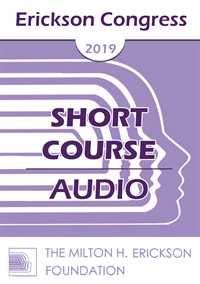
- Average Rating:
- Not yet rated
- Topic Areas:
- Short Courses | Experiential Therapy | Brief Therapy | Resources
- Categories:
- Erickson Congress | Erickson Congress 2019
- Faculty:
- Michael Reiter, PhD
- Duration:
- 1 Hour 3 Minutes
- Format:
- Audio Only
- Original Program Date:
- Dec 12, 2019
- Short Description:
- This presentation will explore the utilization of brief experiential activities in helping clients to access and enhance their naturally occurring resources. Experiential activities help to increase client engagement and participation in therapy as well as connect them to aspect of self that are resourceful. In this session, participants will learn the philosophy behind utilizing in-session experiential activities and how these relate to bringing forth existing client resources.
- Price:
- $15.00 - Base Price
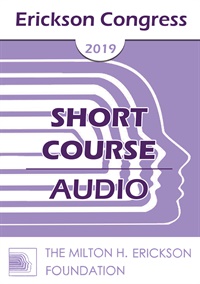
- Average Rating:
- Not yet rated
- Topic Areas:
- Short Courses | Hypnosis | Brief Therapy | Single-Session
- Categories:
- Erickson Congress | Erickson Congress 2019
- Faculty:
- Bob Bertolino, PhD
- Duration:
- 1 Hour 24 Minutes
- Format:
- Audio Only
- Original Program Date:
- Dec 12, 2019
- Short Description:
- There are many ways in which hypnosis can be used to assist clients in accessing and utilizing their internal resources in the service of change. One approach to hypnosis is to create “singles,” brief recordings of three to eight minutes in length, to provide clients with “fingertip resources” that can be accessed quickly and easily. Much like a song on the radio or track played on a phone, brief hypnotic experiences are invitations to clients for rapid absorption, which can facilitate shifts in emotion, cognition, and physiology.
- Price:
- $15.00 - Base Price
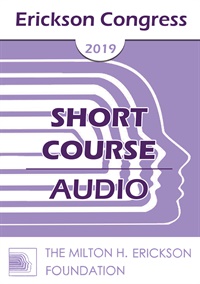
- Average Rating:
- Not yet rated
- Topic Areas:
- Short Courses | Brief Therapy | Pain and Healing
- Categories:
- Erickson Congress | Erickson Congress 2019
- Faculty:
- Timothy Hallbom, MSW | Kris Hallbom, BA
- Duration:
- 1 Hour 23 Minutes
- Format:
- Audio Only
- Original Program Date:
- Dec 12, 2019
- Short Description:
- Created by Tim and Kris Hallbom, Dynamic Spin Release is a powerful set of processes that allows users to quickly release their negative thought patterns and emotions, limiting beliefs and physical pain – in just one brief session. Dynamic Spin Release (DSR) was created using ideas delineated from the world famous psychiatrists, Carl Jung and Milton Erickson – and draws heavily from the psychology of metaphors, NLP, Ericksonian Hypnosis and creative visualization...
- Price:
- $15.00 - Base Price
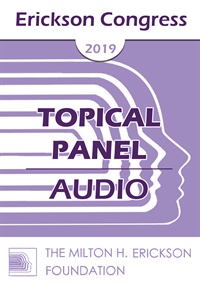
- Average Rating:
- Not yet rated
- Topic Areas:
- Workshops | Obsessive Compulsive Disorder (OCD) | Brief Therapy | Strategic Therapy
- Categories:
- Erickson Congress | Erickson Congress 2019
- Faculty:
- Reid Wilson, PhD
- Duration:
- 1 Hour 58 Minutes
- Format:
- Audio Only
- Original Program Date:
- Dec 12, 2019
- Short Description:
- Learn how to shift the OCD mindset quickly using bold, strategic techniques that move beyond standard Exposure and Response Prevention (ERP). This session covers paradoxical interventions, behavioral experiments, and building a non-scared, competitive attitude toward obsessions. Includes practical tools, case examples, and guidance on assertive, collaborative treatment.
- Price:
- $15.00 - Base Price
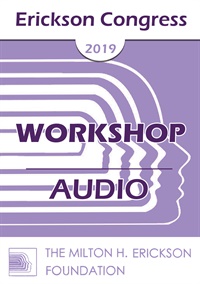
- Average Rating:
- Not yet rated
- Topic Areas:
- Workshops | Energy Psychology | Ericksonian Hypnosis and Therapy Techniques | Hypnosis | Trauma | Psychology | Brief Therapy | Mind-Body
- Categories:
- Erickson Congress | Erickson Congress 2019
- Faculty:
- Robert Schwarz, PsyD
- Duration:
- 1 Hour 54 Minutes
- Format:
- Audio Only
- Original Program Date:
- Dec 13, 2019
- Short Description:
- Energy Psychology (EP) techniques are easy to learn, safe/non-abreactive, evidenced-based, brief approaches, used for everything from bullying to rape to PTSD in veterans to survivors of genocide in Rwanda. Ericksonian Hypnosis and Energy Psychology are brief mind body approaches for treating trauma that both utilize interpersonal neurobiology and memory reconsolidation. We will rapidly review the research and theory supporting them. Then we will focus on teaching you the basics of using emotional freedom techniques (EFT-tapping) within a trauma informed framework and integrating it with Ericksonian principles.
- Price:
- $15.00 - Base Price
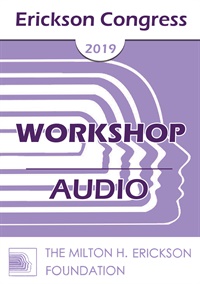
- Average Rating:
- Not yet rated
- Topic Areas:
- Workshops | Hypnosis | Psychotherapy | Brief Therapy | Meditation, Spirituality and Yoga
- Categories:
- Erickson Congress | Erickson Congress 2019
- Faculty:
- Rubin Battino, MS
- Duration:
- 1 Hour 57 Minutes
- Format:
- Audio Only
- Original Program Date:
- Dec 13, 2019
- Short Description:
- Guided imagery (GI) was used initially to help people with life-challenging diseases, yet it is also highly applicable to psychotherapy. A brief history of GI will be presented. The presenter has used it successfully in brief therapy for almost all of his recent clients. Hypnosis is an essential part of GI sessions. The requirements for using GI will be described. It is necessary to tailor the session to the client's individual background and needs, and this will be discussed. The attendees will have the opportunity experience this via a group guided imagery session. And, the session will end with a GI healing meditation.
- Price:
- $15.00 - Base Price
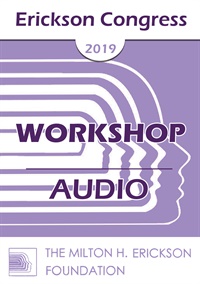
- Average Rating:
- Not yet rated
- Topic Areas:
- Workshops | Brief Therapy | Hypnosis | Experiential Therapy
- Categories:
- Erickson Congress | Erickson Congress 2019
- Faculty:
- Stephen Lankton, MSW
- Duration:
- 2 Hours 3 Minutes
- Format:
- Audio Only
- Original Program Date:
- Dec 13, 2019
- Short Description:
- This workshop will teach six positive techniques that actually make Ericksonian experiential hypnosis successful. Dysfunctional families fail to teach children how to use their experiences to succeed. Consequently, clients learn dozens of self-defeating habits and later present in our offices as adults with depression, anxiety, phobias, etc. The desire to change, insight, and motivation do not counteract those habits - nor does hypnotic suggestion create such change. Experience is the key to cure.
- Price:
- $15.00 - Base Price
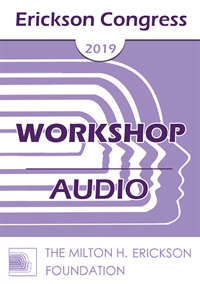
- Average Rating:
- Not yet rated
- Topic Areas:
- Workshops | Love | Brief Therapy | Motivation | Solution Oriented Approach | Therapist Development
- Categories:
- Erickson Congress | Erickson Congress 2019
- Faculty:
- Michael Munion, MA, LPC
- Duration:
- 1 Hour 31 Minutes
- Format:
- Audio Only
- Original Program Date:
- Dec 15, 2019
- Short Description:
- This workshop provides a framework for assessing clients along two important dimensions that impact therapeutic outcome: motivation and sense of agency (one’s perception of their ability to create change in their own lives). This assessment fosters interventions that enhance the capacity for strategic interventions to be truly brief and solution focused. The participant in this workshop will have the opportunity to observe and practice this approach.
- Price:
- $15.00 - Base Price
- Average Rating:
- Not yet rated
- Topic Areas:
- Clinical Demonstrations | Brief Therapy | Eating Disorders
- Categories:
- Erickson Congress | Erickson Congress 1988
- Faculty:
- Carol Lankton, MA
- Course Levels:
- Master Degree or Higher in Health-Related Field
- Duration:
- 57:05
- Format:
- Audio and Video
- Original Program Date:
- Dec 09, 1988
- Short Description:
- IC88 Clinical Demonstration 05 - Short Approaches to Heavy Problems: Brief Therapy for Weight Reduction - Carol Lankton, M.A.
- Price:
- $29.00 - Base Price
- Average Rating:
- Not yet rated
- Topic Areas:
- Clinical Demonstrations | Brief Therapy | Interviewing | Solution Oriented Approach
- Categories:
- Erickson Congress | Erickson Congress 1994
- Faculty:
- Scott Miller, PhD
- Course Levels:
- Master Degree or Higher in Health-Related Field
- Duration:
- 55:41
- Format:
- Audio and Video
- Original Program Date:
- Dec 10, 1994
- Short Description:
- IC94 Clinical Demonstration 02 - SOLUTION-FOCUSED BRIEF THERAPY: HOW TO INTERVIEW FOR A CHANGE - Scott Miller, Ph.D.
- Price:
-
Sale is $29.00
price reduced from Base Price - $59.00
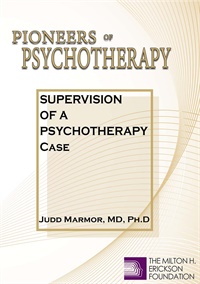
- Average Rating:
- Not yet rated
- Topic Areas:
- Clinical Demonstrations | Psychotherapy | Brief Therapy | Supervision
- Bundle(s):
- Pioneers of Psychotherapy Bundle
- Categories:
- Pioneers of Psychotherapy | Evolution of Psychotherapy | Evolution of Psychotherapy 1990
- Faculty:
- Judd Marmor
- Course Levels:
- Master Degree or Higher in Health-Related Field
- Duration:
- 00:59:00
- Format:
- Audio and Video
- Original Program Date:
- Dec 12, 1990
- Short Description:
- Judd Marmor (1990) outlines the history of brief dynamic psychotherapy by outlining the psychotherapy beginning with Freud and psychoanalysis. He profiles patients he believes will benefit from short-term therapy. He then conducts supervision with two volunteers. Following the demonstration Marmor discusses his technique.
- Price:
- $59.00 - Base Price
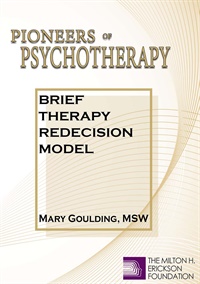
- Average Rating:
- Not yet rated
- Topic Areas:
- Clinical Demonstrations | Redecision Therapy | Brief Therapy | Psychotherapy | Relationships
- Bundle(s):
- Women Pioneers of Psychotherapy | Pioneers of Psychotherapy Bundle
- Categories:
- Pioneers of Psychotherapy | Evolution of Psychotherapy | Evolution of Psychotherapy 1995
- Faculty:
- Mary Goulding, MSW
- Course Levels:
- Master Degree or Higher in Health-Related Field
- Duration:
- 00:59:00
- Format:
- Audio and Video
- Original Program Date:
- Dec 15, 1995
- Short Description:
- Mary Goulding (1995) demonstrates with three volunteer clients. The first is disturbed because his mother did not spend much time with him during childhood. Next Dave is concerned about his distant relationship with his son. The third, Diane describes problems with her mother who is now a widow and overly critical. Goulding explains her work.
- Price:
- $59.00 - Base Price


